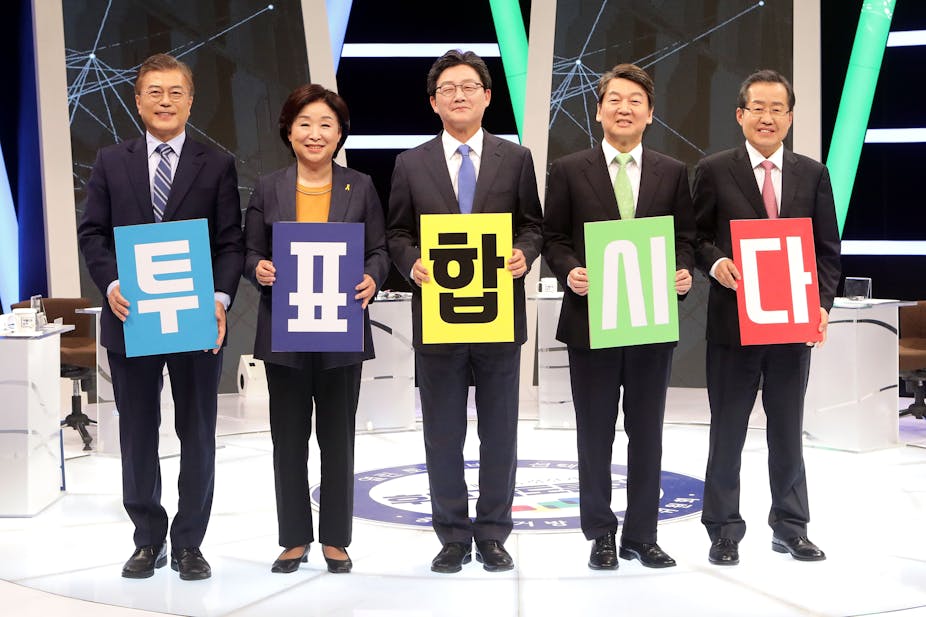South Korea is under serious pressure on two fronts. Internationally, Seoul and its allies are scrambling to head off the threat from North Korea, which some fear is ramping up for another nuclear test – but the South Korean response to that threat will to some extent be determined by what happens in its presidential election on May 9.
Brought forward to fill the vacancy left by the conservative Park Geun-hye after she was impeached and jailed for corruption, the election initially looked like an easy win for former human rights lawyer Moon Jae-in, who served in the government of Roh Moo-hyun in the 2000s and whose Democratic Party controls 119 parliamentary seats.
But while Moon is still considered the frontrunner, he has one serious challenger: Ahn Cheol-soo, a doctor and former software entrepreneur who leads the centrist People’s Party. Ahn is struggling to contrast himself clearly with Moon – not least because in 2012, he gave up his presidential ambitions to support Moon’s challenge to the now-disgraced Park.
With no serious conservative contender, the election has become a race between two liberal candidates. The question is which one can successfully win over the popular movement that ousted Park as the two heavyweights duly rush to distance themselves from their scandalous predecessor.
Moon has been the more successful, painting himself as the antidote to systemic corruption and cronyism, whereas Ahn is presenting himself as an anti-establishment new kid on the block. His “new politics” is a possible middle way between unpopular conservative parties and what some more right-wing voters consider Moon’s insufficiently hawkish positions.
And while there is no serious conservative contender in this election, conservative voters may yet play a decisive role. Ahn has shifted to the right on national security and North Korea policy, and while the electorate as a whole appears to have moved toward the progressive side, security-minded voters will favour Ahn in a close race.
And security could scarcely be a bigger issue, thanks to the threat from North Korea – and Donald Trump’s perplexing pronouncements on what to do about it.
Balancing acts
Trump first upbraided China for failing to bring North Korea to heel, then decided that collaborating with Beijing is the answer. He said that a “major, major conflict” is possible, and that the US is ready to take unilateral action, but also that he’s keeping his options open against “smart cookie” Kim Jong-un, whom he’d be honoured to meet.
Trump has sent mixed messages on South Korea, too. He reaffirmed the US’s “ironclad commitment” to South Korean security, but recently flip-flopped over whether or not Seoul should pay for the deployment of the controversial THAAD (Terminal High Altitude Area Defence) missile system, and is now threatening to renegotiate or scrap the US-Korea Free Trade Agreement.
Breaking with hardline conservative policy, Moon favours diplomatic engagement with North Korea and a more independent approach to South Korea-US relations. He has promised direct talks with North Korea’s leadership and expressed scepticism about THAAD. Saying that he sees Trump trying to bring Kim Jong-un to the negotiating table, Moon ventured that Trump is perhaps more reasonable than is generally thought.

Ahn would apparently keep THAAD, and approves of international sanctions against North Korea – things that will win approval from the Trump administration, but may cause friction with China. He is also rather less assertive than Moon when it comes to the sensitive issue of inter-Korean dialogue. Whereas Moon is clear about what his foreign policy will look like – that is, traditionally progressive – Ahn’s lack of political experience and still-evolving political identity are serious weaknesses, and they will cost him at the polls.
Whether it’s Moon on Ahn, the next South Korean president will face the same daunting to-do list. He’ll have to handle a nuclear North Korea and balance relations with China, the US and Japan. He will have to manage at least four years of a Trump presidency, and tackle the constitutional reforms needed to put to rest the ghosts of Park’s presidency. And above all, he will be called on to rebuild Korean politics on the basis of increased transparency, higher democratic participation and trust.

